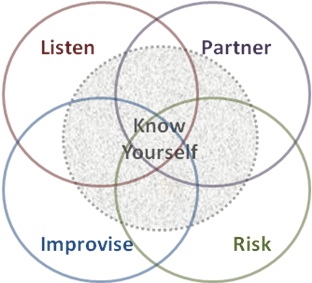 Please take two deep breaths to calm yourself and find a place of zen before answering the below question.
Please take two deep breaths to calm yourself and find a place of zen before answering the below question.
All calmed? Good. From that place of inner peace and quiet, ask yourself which of the following two statements you more strongly agree with:
(Answer instantly, don’t over-think):
- The purpose of business is to make people happy
- The purpose of people is to make business happy
Make a note somewhere of your answer. Now let’s talk about it.
My guess is you chose #1. Maybe not because you totally agree with it, but because #2 seems so absurd. Of course people have purposes beyond being economic cogs; it’s insulting to our humanity to think otherwise. (Anyhow, that’s how I think of it).
Joseph Campbell had it right when he said:
“We’re so engaged in doing things to achieve purposes of outer value that we forget that the inner value, the rapture that is associated with being alive, is what it’s all about.”
And yet: that is not how we behave. Let’s pick on the employee engagement movement as one example [1]: over and over in business, we confuse the means with the ends. And it’s not pretty.
Business Treats People Like Means to an End
A typical post asks, “Why is employee engagement important?” and answers the question thus:
Engaged employees learn more, grow faster, and show more initiative than employees who are not. They are committed to finding solutions, solve problems, and improve business processes.
Therefore, employee engagement is strongly linked to business performance!
All that’s missing is the QED: Obviously, the purpose of employee engagement is to improve business performance. A happy employee is a productive employee; we want you happy because we want you making money for us. Left unspoken is, “and if your being unhappy led to greater productivity, we’d go for unhappy in a heartbeat.”
There is an unending corporate appetite for this sort of rationalization. Here’s the abstract of an article from The American Society for Quality:
Abstract: Weak workforce engagement can lead to poor retention, increased absenteeism and lowered productivity.
Or, from Corporate Rewards, answering the question “Why Bother with Engagement?”
90% of the employees at the World’s Most Admired Companies identified their company as very effective or effective at fostering high levels of employee engagement. Reason enough to bother with engagement…
Organisations need to bother because engagement is the holy grail of workplace relations. It is a virtuous circle: engaged employee; better results; deeper engagement.
There are thousands of such examples; enough, you know that’s true.
The behavioral instinct to subordinate people is evident in the very language of HR. People are not called people, they’re called human “resources”. Note that the word “human” is the adjective, modifying the noun “resources.”
The ante got raised about a decade ago when we started talking about Human Capital. The substitution of “capital” for “resources” was part and parcel of a general reduction of all things business to financial terms. Manufacturing, services, geographies, cultures, people—who cares, it can all be reduced to the single fungible terminology of net-present-financial value. It’s all about the money.
It Wasn’t Always This Way
You may think Joseph Campbell, the scholar of myths cited earlier, doesn’t have enough business credentials to be cited here. If so, let’s try Peter Drucker, the quintessential business writer. He famously said:
The purpose of a company is to create a customer…the only profit center is the customer.
Dale Carnegie had much the same idea when he phrased his paradoxical aphorisms about success coming from focus on others.
Our ideas today about the role of people in business are more culturally-driven than we like to think. There is no revealed truth that says for once and for all what the purpose of business is, or must be: it is what we choose to believe that determines what we get out of business.
We have been choosing a politics, culture and way of business life for some time now that subordinates human benefit to the aggrandizement of corporate entities. That belief system has gotten so imbued in our language and behaviors that we notice it about as much as a fish notices the water it swims in.
It’s Time to Re-Think the Ends and Means of Business
While we’re mesmerized by the sloppy but energetic political revolutions in the Middle East, there’s an equally energetic (and yes, often sloppy) revolution in business thinking going on.
Two widely known examples are Michael Porter and Mark Kramer’s Shared Value concept, and Umair Haque’s Capitalist Manifesto. And while I’ve critiqued their sloppiness, there’s no question they’re heading in the right direction, and spreading a lot of heat and light along the way.
There are other revolutionaries out there. Robert Eccles is spearheading an amazing drive to integrate corporate performance reporting. Chris Brogan and HubSpot Marketing are revolutionizing the notion of marketing and strategy to become truly customer-centric—not customer-centric like a vulture, but for the sake of the customer.
Dave Brock talks about sales as being at a new inflection point: this inflection point, unlike the two prior ones, is driven by the customer—not the company.
And speaking of inflection points, the new Dean of the Harvard Business School uses that same term to describe what faces HBS, which implies a radically different set of priorities.
The Point of Being Happy is to Be Happy: Not to Increase ROI
There’s nothing wrong with making money, creating businesses, having fabulously healthy economies. I’m all for it. Capitalism is a great model.
But let’s start getting our means and ends back in a row: when we start justifying happiness in terms of corporate ROI, something has gone horribly wrong.
Happiness and ROI go together. We should resist making one solely the means and the other solely the end, but let’s remember: if and when we’re forced to prioritize, the true end is happiness.
———————————————-
[1] I’m going to casually equate employee engagement and happiness here, as do many casual authors. EE fans may quibble about that, but the logic of this post applies to each; pick your preferred words.
 Fri. Apr. 15th Global Charles H. Green
Fri. Apr. 15th Global Charles H. Green![]() Wed. Apr. 20th Washington, DC Andrea P. Howe
Wed. Apr. 20th Washington, DC Andrea P. Howe![]() Wed. Apr. 27th Fargo, ND Sandra Styer
Wed. Apr. 27th Fargo, ND Sandra Styer![]() Wed. May 18th Boston, MA Stewart Hirsch
Wed. May 18th Boston, MA Stewart Hirsch Tues. & Wed. May 24th-25th London, England Julian Powe & Charles H. Green
Tues. & Wed. May 24th-25th London, England Julian Powe & Charles H. Green The first tranche of the Trusted Advisor Mastery Program has completed the 19 modules in the program, individual coaching calls and its third group call, and the members have agreed to keep up lively discussions on the online Forum. Here’s what one participant has to say about the program:
The first tranche of the Trusted Advisor Mastery Program has completed the 19 modules in the program, individual coaching calls and its third group call, and the members have agreed to keep up lively discussions on the online Forum. Here’s what one participant has to say about the program:
 Nestled between the delicious food shots and cool clothes in the April print issue of
Nestled between the delicious food shots and cool clothes in the April print issue of 
 I am very proud to announce with my co-author
I am very proud to announce with my co-author  One of my sons regularly takes our dog to the local dog park. Recently, while breaking up some overly rough play between ours and another dog, my son was bitten and needed medical attention. Word spread quickly about the bite. To ward off rumors and gossip, and because the bite wasn’t the result of a vicious act, my son refused to say which dog bit him.
One of my sons regularly takes our dog to the local dog park. Recently, while breaking up some overly rough play between ours and another dog, my son was bitten and needed medical attention. Word spread quickly about the bite. To ward off rumors and gossip, and because the bite wasn’t the result of a vicious act, my son refused to say which dog bit him. Please take two deep breaths to calm yourself and find a place of zen before answering the below question.
Please take two deep breaths to calm yourself and find a place of zen before answering the below question. Mon. Apr. 4th Global Charles H. Green
Mon. Apr. 4th Global Charles H. Green A competency model won’t answer the mail when it comes to building trustworthiness—in fact,
A competency model won’t answer the mail when it comes to building trustworthiness—in fact,  The first tranche of the
The first tranche of the